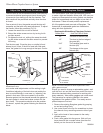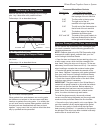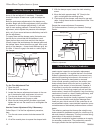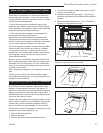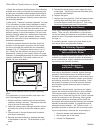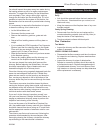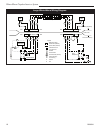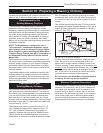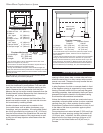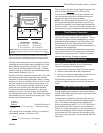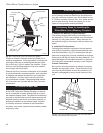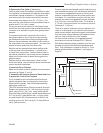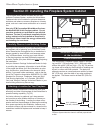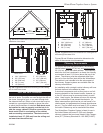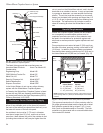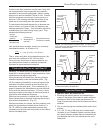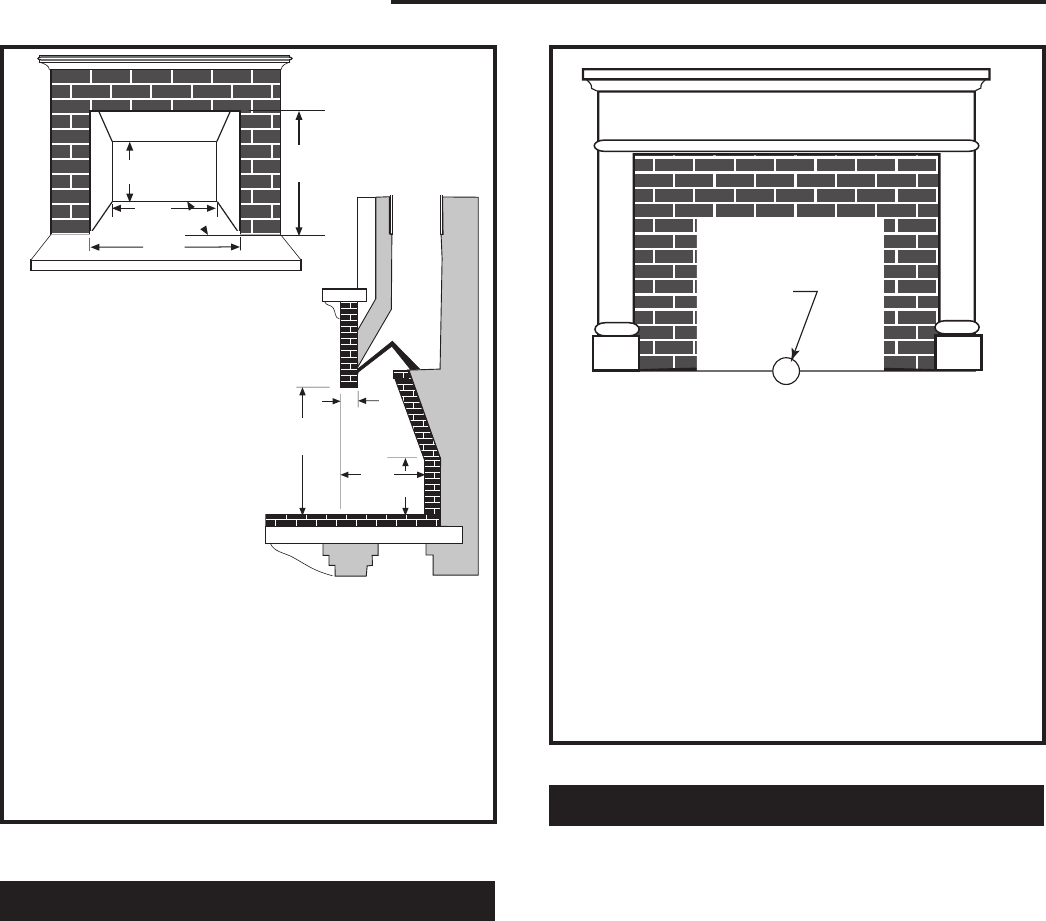
18
WinterWarm Fireplace Insert or System
2000941
Clearance Requirements
After confirming that your fireplace is the right size,
check the clearances to combustibles. First mark with
tape the exact center of your fireplace opening on the
hearth. Measure the side clearance from this point.
Measure the top trim and/or mantel clearances from the
finished hearth surface. Measure the front clearance (to
furnishings, etc.) from the fireplace face.
NOTE: The clearance between the WinterWarm Fire-
place Insert and the mantel, top trim and side trim can-
not be reduced by installing shields.
Another clearance requirement to consider is that
for movable items such as tables, bookcases, rugs,
furnishings, and your woodbox. All combustible materi-
als of this type should be a minimum of 48” (1219 mm)
from the front surface of the WinterWarm. Be sure that
family members are aware of this requirement as well,
so they too will keep objects a safe distance from the
WinterWarm.
A,I
B
C
D,J
E
D,J
H
F,
G
C
E
FP1084
winterwarm
fireplace minimum dimensions
3/01
Fireplace Minimums
A. Width at Face 34” (864 mm)
B. Width at
18
¹⁄₂” depth 22” (559 mm)
C. Depth
1
19” (483 mm)
D. Height at Face 24” (610 mm)
E. Height at
19¹⁄₂” depth 16” (406 mm)
F. Damper Width
2
5” (127 mm)
G. Damper Length
2
14” (356 mm)
Fireplace Maximums
H. Lintel depth 6³⁄₄” (172 mm)
I. Width
3
51” (1295 mm)
J. Height
3
36” (914 mm)
FP1084
1. The minimum depth must be maintained from the floor of the
fireplace to a height of 16” (416 mm).
2. These are the minimum damper dimensions required for use of
the Vermotn Castings Flex Connector System.
3. Though the WinterWarm Fireplace Insert will fit into larger fire-
places, the decorative surround panels will not completely cover the
fireplace opening if these dimensions are exceeded. Custom made
trim may be used.
Fig. 19 Use thes measurements to confirm that the Winter-
Warm will fit into your masonry fireplace.
X
FP1085
WinterWarm
clearances
3/01
C
A
B
Fireplace Clearances
Masonry Fireplace System
Fireplace Cabinet
A. Mantel* 38¹⁄₂” (978 mm) 43” (1092 mm)
B. Top Trim* 38¹⁄₂” (978 mm) 43” (1092 mm)
C. Side Trim** 24” (610 mm) 24” (610 mm)
Measure side
trim clearance
from here
FP1085
*The mantel and/or top trim must be 9” (229 mm) in depth or less.
For the WinterWarm System, measure from the supplied trim
panel forward.
**Where side trim extends more than 2” (52mm) from the fireplace
facing, the side clearance must be no less than 42” (1067 mm).
Measure the side clearance (C) from the exact center of your fire
-
place opening on the hearth (X). Measure the top trim (B) and/or
mantel clearances (A) from the finished hearth surface. Measure
the front clearance (to furnishings, etc.) from the fireplace face.
Fig. 20 Observe these clearances to combustible trim.
Hearth Requirements
In some fireplaces, the hearth in front of the fireplace
opening is brick, stone, slate, or some other non-com-
bustible material that is in direct contact with concrete
poured over earth. These are the only hearths that are
considered noncombustible.
In other fireplaces, the brick or concrete hearth in front
of the fireplace opening is supported by heavy wooden
framing. Because neither brick nor concrete has good
insulating properties, heat radiated by the fire will pass
downward through the hearth to the wooden framing.
Such hearths are considered combustible.
Unless the fireplace and hearth are constructed over a
completely noncombustible surface (such as unpainted
concrete over dirt), a floor protector must be used in
WinterWarm Fireplace Insert installations in front of and
to the sides of the door as protection against spilled
coals and embers.
Floor protectors must extend at least 8” (203 mm) from
the side of the door opening, making the protector 40”
(1016 mm) wide. In addition, the floor protector must
extend from the front door opening a minimum of 16”
(410 mm) in the United States and 18”(457 mm) in
Canada.



